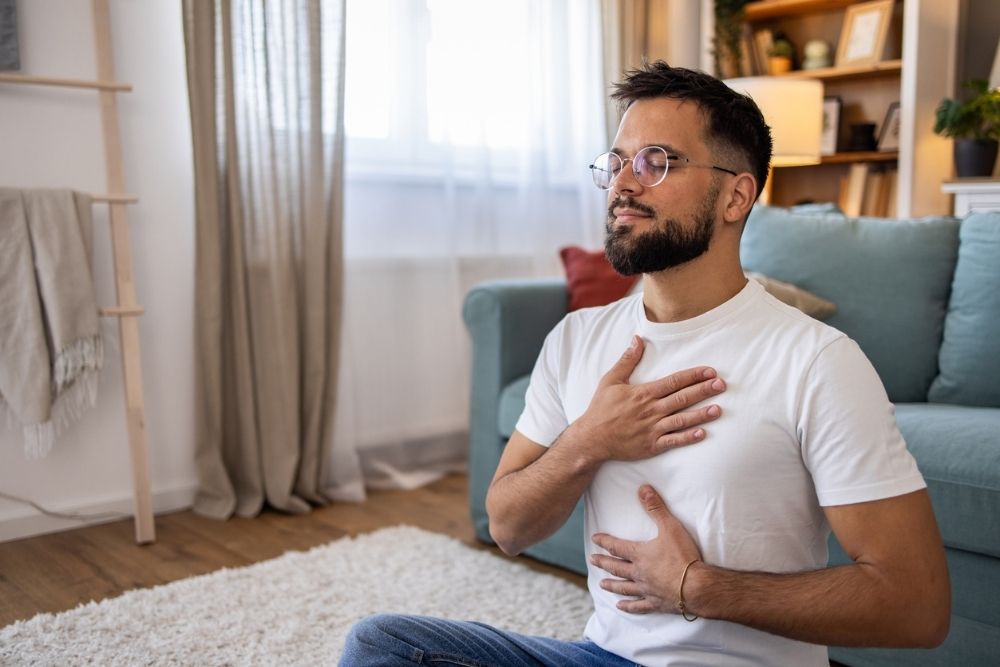As a rule, people like to tackle problems by taking action. There is an understandable sense that actions—whether big or small—are the engines when it comes to changing an unfavorable situation into a favorable one. Make the argument, vanquish the foe, or get your hands dirty, and you can make positive changes for yourself and others.
Oftentimes, this is true. Taking action can indeed be the best route toward solving a problem.
But in some cases, a purposeful strategy of inaction can be just as—if not more—effective.
If, for example, you are a person in recovery from a substance use disorder, there are three practices that are more about doing less than they are about taking action.
Let’s take a look at mindfulness practice, urge surfing, and yoga and the ways in which each can support your recovery.
Keep Mindfulness in Mind
It is all too easy to live our lives shifting back and forth between replaying the past and worrying about the future. And both can be problematic when it comes to staying sober.
If you allow yourself to obsess over past mistakes and regrets, you may find yourself tempted to return to drugs or alcohol to block out the bad memories—or because you (wrongly) decide that your troubled past means you don’t deserve a good future.
And if you worry about the future all of the time, you may find yourself tempted to return to drugs or alcohol to lessen the anxiety—or because you (wrongly) are afraid that you will not be able to manage challenges you might face while sober.
Fortunately, there is another place to rest your mind: the present. And that is what mindfulness is all about. Mindfulness practice is centered on keeping your focus in the present moment, treating your thoughts and emotions gently and without judgment, and developing a sense of equanimity that can help you face challenges as they arise.
And the primary approach to developing a more mindful life? Sitting comfortably and quietly while focusing on the sensation of your breathing.
Follow the Urge to Urge Surf
Urge surfing sounds pretty darn active. After all, actual surfing is an active, physical endeavor. And by and large, when we think of urges, we think of the actions that might satisfy those urges.
But urge surfing is a specific approach to mindfulness that involves sitting quietly and bringing your attention to the physical sensations in your body that seem to be associated directly with your cravings. By identifying those sensations and then describing them to yourself, you may well discover that you can, in effect, turn down their intensity—allowing you to withstand cravings more effectively.
We Propose Striking a Pose
Now, we admit that yoga is somewhat more active than mindfulness practice and urge surfing. Sure, it involves moving from pose to pose. But all in all, yoga is a quiet activity that has much in common with mindfulness. It asks you to focus on your body and breath—and to stay in the present moment.
And like mindfulness, yoga has been shown to reduce stress levels—another benefit that can help you maintain your hard won sobriety.
How to Get Started
Maybe we have convinced you that these strategies could be effective for you—even though they involve (indeed, require) less action than we are used to employing when we are trying to accomplish a goal. But you may wonder how to get started with mindfulness or yoga (remember that urge surfing is a specific sort of mindfulness practice).
There are a number of options. For example, there are many mindfulness apps to try. You can also find online or home video options to help you get started with yoga. If you prefer a more social, in-person approach, you will likely be able to find mindfulness and yoga classes in your community.
Here’s an Action You Should Take: Get the Help You Need
At Wooded Glen Recovery Center in Henryville, IN, we are committed to helping individuals who are struggling with drugs or alcohol regain and maintain their sobriety. We offer medically supervised detoxification and a rehabilitation program built around individual and group therapy. We are also equipped to address any co-occurring mental health disorders—including depression, anxiety, trauma-based disorders, and more—that may be contributing to (or be worsened by) a substance use disorder.
We have spent this blog talking about strategies for recovery that don’t involve a whole lot of action. But getting sober definitely requires you to take action. When you are ready to take that essential action, we are ready to provide the help and support you need.

